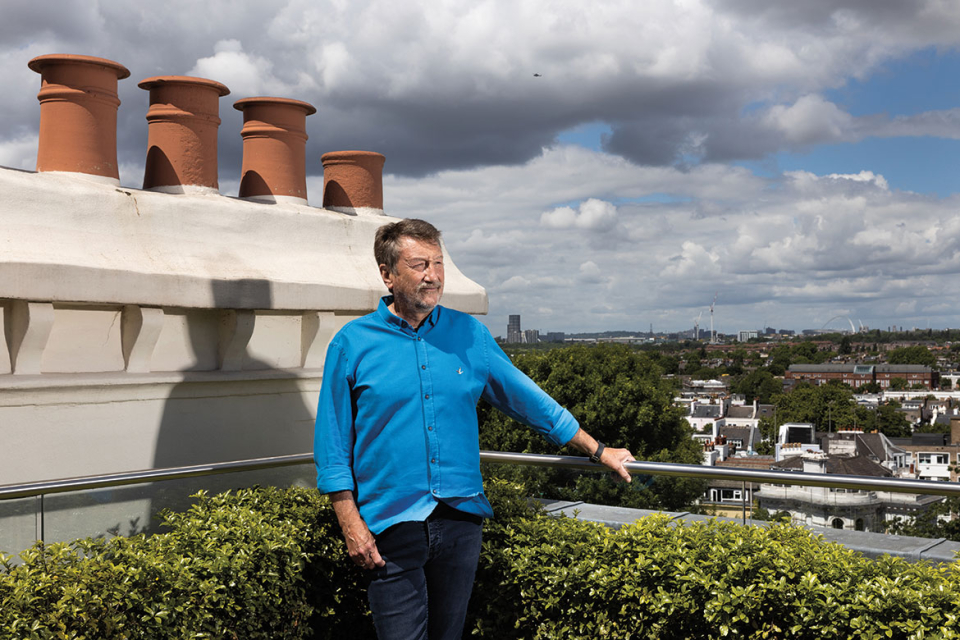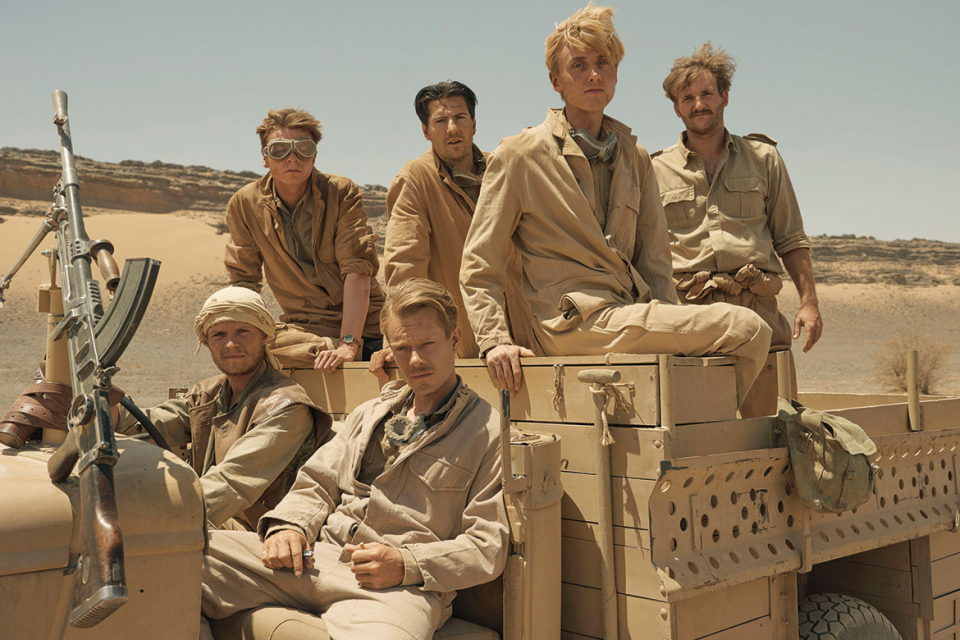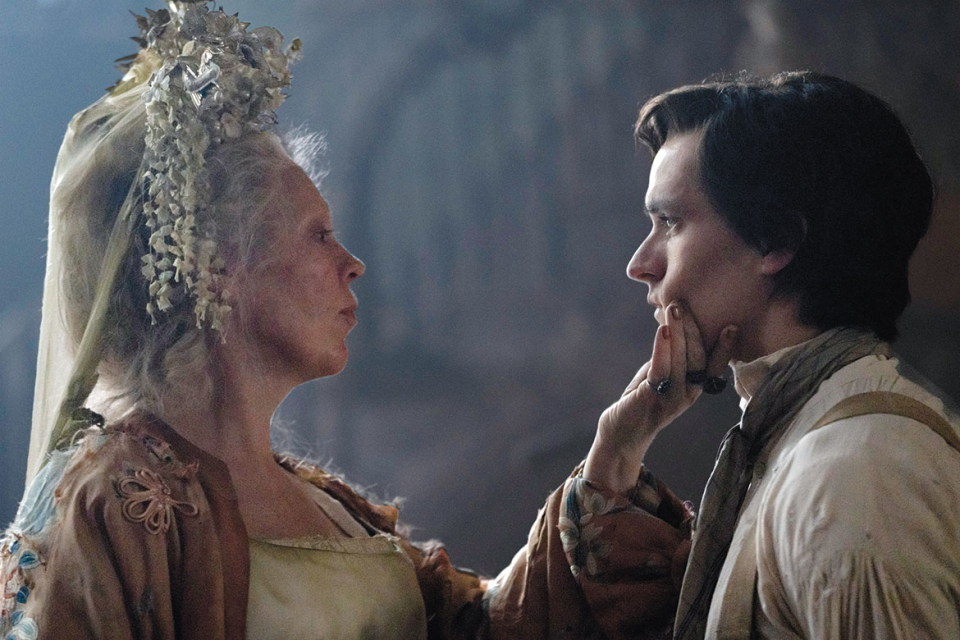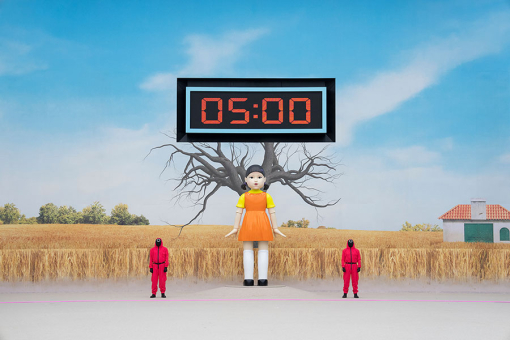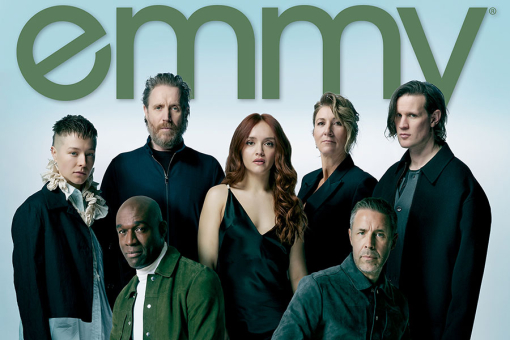There's always been a dash of suspicion about prolific writers. Quantity and quality are seen to sit on opposite ends of the seesaw: if one goes up, the other must go down. Writers who sweat over projects for years are revered craftsmen, while hacks just churn it out.
The British screenwriter Steven Knight disproves all of this. His output is astonishing both in its volume and its excellence. He writes popular, award-winning films — Dirty Pretty Things, Eastern Promises, Serenity, Spencer — as well as popular, award-winning television — Peaky Blinders, See, Taboo. He is not, as that list shows, limited by genre or period or format. What's more, when Knight writes television, he tends to write every single line of every single episode.
"From the first pitch on Peaky Blinders," says executive producer Caryn Mandabach, "Steven had an intention to have multiple seasons much in the way the United States does things, but it was minus the writers' room — and that cannot be said enough. What a remarkable, unbelievable effort and extraordinary achievement it was, writing thirty-six hours alone. For those of you who can divide by two, that's eighteen movies."
Since the end of Peaky Blinders' run on Netflix last year, Knight has upped his pace. This year we can look forward to a limited-series adaptation of Charles Dickens's Great Expectations, with Olivia Colman as Miss Havisham (BBC/FX, premiering March 26 on Hulu); a limited-series adaptation of Anthony Doerr's 2014 novel, All the Light We Cannot See (Netflix); a limited-series thriller for FX called The Veil, with Elisabeth Moss; a period retelling of the Enzo Ferrari story (Apple TV+) and a nineteenth-century boxing drama called A Thousand Blows, starring Stephen Graham (Disney+).
What is Knight's creative wellspring? Where does it all come from? Several of his creations started with family fireside chats. The original impetus for Peaky Blinders, for example, came from stories his parents told when he was a boy growing up in Britain's West Midlands.
"They were stories from when they were kids, about these people, these illegal racketeers, who were my dad's uncles. To them they were terrifying, legendary, mythological figures." They dressed smartly, wore flat caps and were known around Birmingham as Peaky Blinders.
Season two of Rogue Heroes (BBC/MGM+), a U.K. Special Forces origin story, is coming next year. The series is based on a book, but again, Knight's interest stemmed from his family: his father served in the British Eighth Army in the Second World War.
"When I was a kid, I used to ask him, 'What was it like?' And he said, 'We used to play cowboys and Indians.' And that was all he'd ever tell. I found out he'd won medals and all sorts of stuff. So I always wondered what it was like. I started to do the research and found it was just the most amazing story."
Knight says all his writing comes from some sort of personal connection with character, place or story. "You have to feel something about the subject, you have to be able to put yourself into that situation in order to have that energy running, that will get you through. For me, anyway. Of course, as a writer you have to see yourself in many situations, and in many personalities and in many different characters. But you have to have something there that really connects to you before you can start."
Once he does start, Knight is not a planner. Though he often has several concurrent projects on the go, there are no walls of Post-it notes in his office, no spidery plot maps or 1,000-word character arcs.
"It sounds ridiculous, I know, but the truth about the process for me is when I start, it just ... happens. It's like dreaming or playing a musical instrument — I just do it. And then I read it back and I have to piece it together from what I've written."
Knight's process doesn't fit with the writers' room system that predominates in modern television; he always works alone, and though he doesn't disparage planning or writers' rooms ("It's just a different way of doing the same thing, and some of the best stuff ever produced has come as a consequence of it"), his way clearly works for him.
He does say that writers' rooms, breaking stories and parsing narratives can sometimes snuff out the fantastical at its source. If there is a throughline to Knight's body of work it's that the most bizarre things can happen at any moment and he loves historical coincidences.
"If you're in a room and you're discussing something, it's very difficult for someone to put something forward that's irrational. The first comment is always, 'That doesn't make sense at all. That wouldn't happen.' I'm very suspicious of 'That wouldn't happen.' Because you just don't know what would happen — and what really happens in life is so weird."
At times, this kind of solitary, instinctive writing has its downsides. Knight is gracious enough to proffer examples of movies he wrote and directed where his method has taken him down some blind alleys. "I'm sure people watching Serenity [his 2019 mystery-thriller with Matthew McConaughey and Anne Hathaway] or Hummingbird [a 2013 revenge-thriller with Jason Statham, later retitled Redemption] — ventures which have been purely my own thing, have said I should have done more planning. I'm sure certain people watching it would say, 'Well, why didn't you do it that way?' But I can't do it. And personally, I'm always most proud of the ones that usually get the least good response."
Yet Knight isn't only a dreamweaver or a Promethean maverick. He is equally at home adapting other writers' work. Great Expectations, a new six-part limited series for FX, is his second Dickens adaptation after 2019's A Christmas Carol. The story of Rogue Heroes is based on Ben Macintyre's 2016 book SAS: Rogue Heroes, while both All the Light We Cannot See and Ferrari, his second series for Apple TV+, are dramas that stem from books (in the latter case, Ferrari Rex by Luca Dal Monte, released in the States in 2018 as Enzo Ferrari: Power, Politics, and the Making of an Automotive Empire).
Dickens, Knight says, would be a screenwriter or a novelist ("probably both") if he were working today. "I think he would be doing screenplays, because the joy of Dickens is the dialogue and the way the characters express themselves through dialogue."
In Dickens he sees a kindred spirit — an author as popular as he was lauded, a writer who spooled out words by the yard and liked to follow his nose. "Sometimes when I read Dickens I think to myself, 'I don't think he planned that.' He seems to go down little alleyways of writing and takes you into some shop or something that's nothing to do with the plot. And people sort of block those bits out," Knight says.
Those are the bits he likes the most. When adapting Dickens, Knight asks himself what the great writer would write about if he were working now. "Obviously, at the time, he was restricted: he couldn't write about gay people, he couldn't write about sex. Reading factual accounts of what London was like, there was a lot of stuff going on that he couldn't write about. So I just wondered if it wouldn't be possible to tell those stories again, but be able to talk about the other bits that were going on."
When it comes to which Dickens stories Knight chooses to adapt, it's often the case that something in the research will resonate with his own life and family. "With something like Great Expectations, Pip is the son of a blacksmith who doesn't want to be a blacksmith ... which is what I was. My dad was a farrier. He used to shoe horses. And I used to be taken out shoeing horses, and I loved it, but I wasn't any good at it. So that's my way into Great Expectations — through Pip and that feeling when he's of that age: 'So what am I going to do?'"
Knight knows about the unlikely because he is unlikely himself. He grew up near Birmingham, then moved to London to study English literature before starting out as a novelist and writer. Some of his first work was writing property descriptions for realtors. His big break came in television but not in drama.
"I worked at an office in a television production company that did game shows and comedy and drama as well," he recalls. "I was writing TV and writing novels at the time but if you had a game-show idea you could walk up the stairs and go, 'I've got a game show.' So me and a couple of people I worked with quite a bit [Mike Whitehill and David Briggs], we came up with a few game shows that did okay."
One of them did more than just okay. It was called Who Wants to Be a Millionaire and it went on to become an international franchise. It's interesting to hear Knight talk about Millionaire now. It's clear that even from its inception, he saw it as theater as much as a competition with a set of clever rules.
"It turned out that 'Phone a Friend' [an element of the show] was a little human drama all in itself. The first one we ever did, this girl phoned her dad and asked him a question ... that he didn't know. And she was so shocked. It was incredible to watch."
Millionaire gave Knight the time and the means to follow his passion, which was writing. It also provided him with a useful story to tell as he made his way up the screenwriting ladder.
"When I first started getting wheeled around Hollywood, when I first got an agent, it was a curiosity that got you into the room — a conversation topic. Again, I do like to do different things."
But it was Peaky Blinders that elevated him to the international A-list. "It has made a difference to me. I think the main thing is that it's television. I wrote a treatment for Peaky probably twenty-odd years ago, and luckily it didn't get picked up because it would have been a different era of television, and there wouldn't have been the technologies to do it. But Peaky came just at the beginning of when television was changing. I was asked if I had any television ideas and that's why I started doing television again."
Modern television, he says, is a screenwriters' medium first and foremost. "It's the amount of time you've got," Knight says. "In something like Peaky, you get a lot of time to have an unsympathetic lead, for example, and you can make that character sympathetic over a long period of time."
Longform television's sheer volume (it's called longform for a reason) means there's even more work for the writer. This in turn makes Knight's productivity all the more remarkable.
"The work ethic comes from the fact that I can't stop doing it," he says. "Actually, it's that I couldn't not do it — that I find it difficult to have a day without writing. Especially if I get into something — then I can't wait to get back on it and see how it goes."
This article originally appeared in emmy magazine issue #2, 2023.



